
 i_need_contribute
i_need_contribute

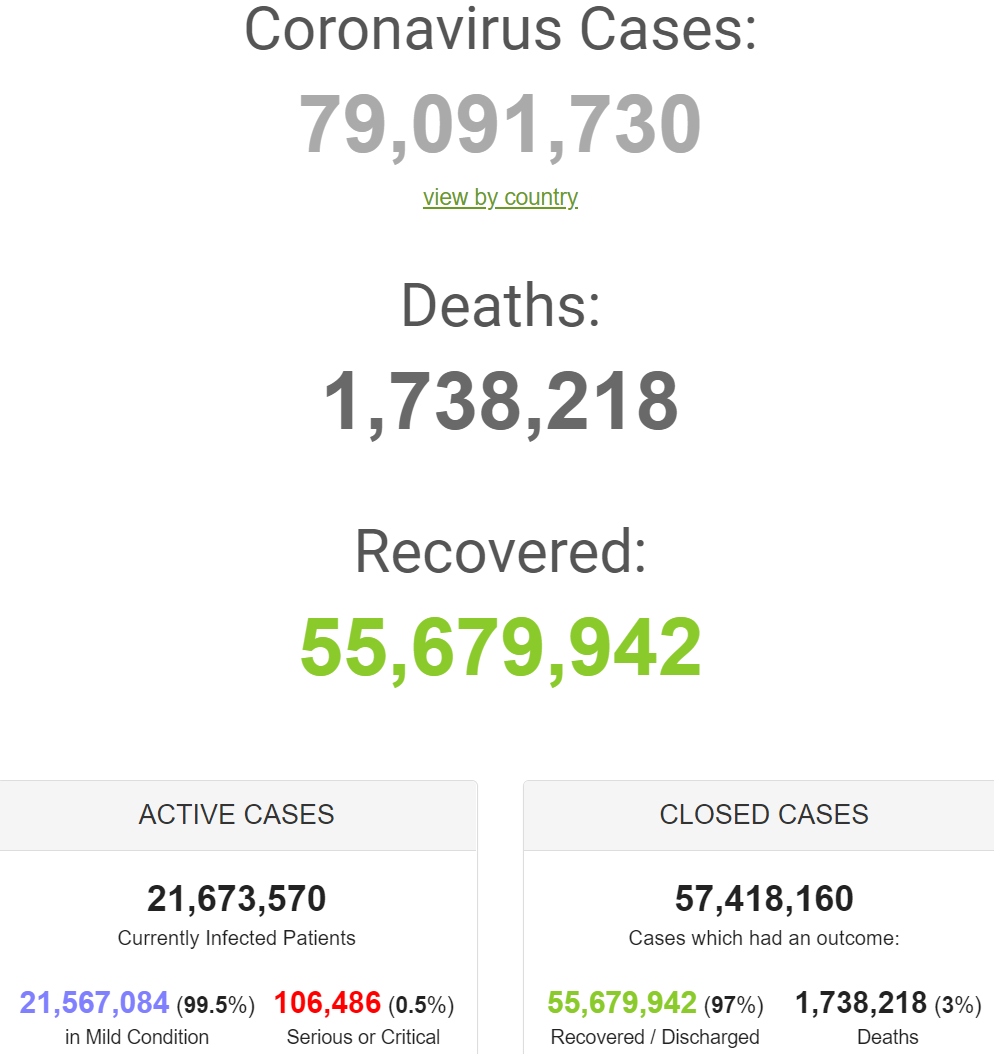
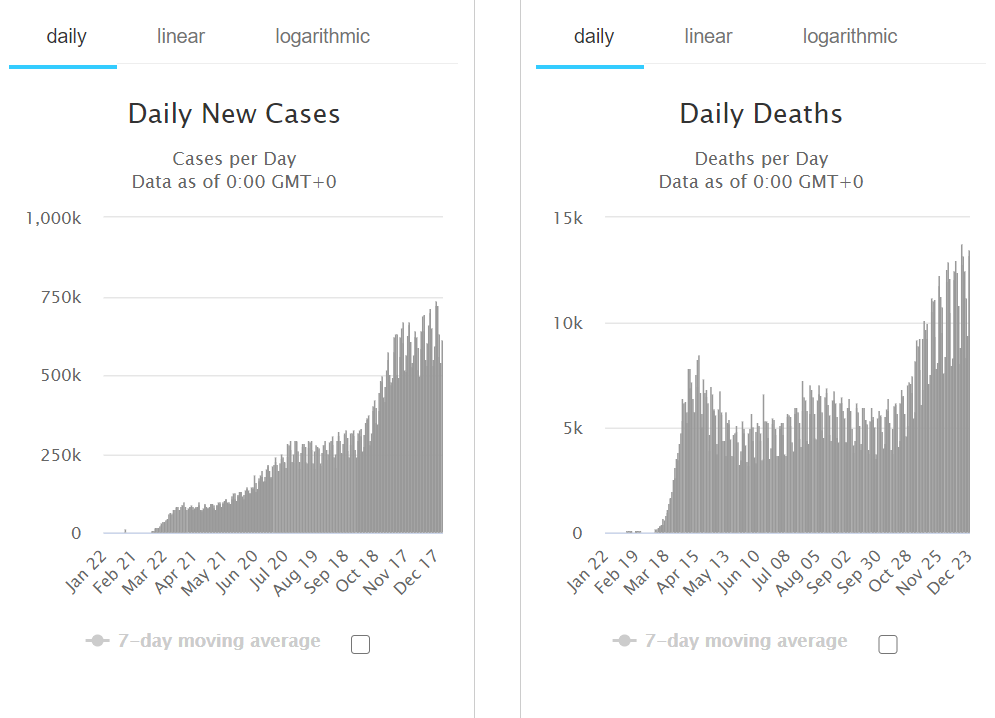
|
Country, |
Total |
New |
Total |
|
World |
79,036,630 |
+683,256 |
1,736,720 |
|
18,917,152 |
+232,342 |
334,218 |
|
|
10,123,544 |
+24,236 |
146,778 |
|
|
7,366,677 |
+46,657 |
189,264 |
|
|
2,933,753 |
+27,250 |
52,461 |
|
|
2,505,875 |
+14,929 |
61,978 |
|
|
2,149,551 |
+39,237 |
69,051 |
|
|
2,082,610 |
+19,650 |
18,861 |
|
|
1,991,278 |
+14,522 |
70,395 |
|
|
1,847,874 |
+9,220 |
49,698 |
|
|
1,587,908 |
+31,297 |
29,127 |
|
|
1,563,865 |
+8,586 |
42,314 |
|
|
1,544,826 |
+14,233 |
41,174 |
|
|
1,338,426 |
+12,511 |
119,495 |
|
|
1,226,883 |
+12,361 |
26,255 |
|
|
1,177,004 |
+6,261 |
54,156 |
|
|
1,002,263 |
+2,110 |
37,273 |
|
|
989,642 |
+10,136 |
17,172 |
|
|
954,258 |
+14,046 |
25,657 |
|
|
721,071 |
+10,388 |
10,737 |
|
|
685,639 |
+7,514 |
20,408 |
|
|
646,407 |
+10,888 |
10,719 |
|
|
629,109 |
+2,198 |
18,821 |
|
|
604,251 |
+5,459 |
14,766 |
|
|
590,914 |
+1,725 |
16,228 |
|
|
587,676 |
+1,173 |
12,737 |
|
|
528,354 |
+6,845 |
14,597 |
|
|
504,868 |
+1,367 |
7,359 |
|
|
463,948 |
+1,140 |
9,048 |
|
|
462,814 |
+2,142 |
9,557 |
|
|
423,214 |
+2,566 |
7,086 |
|
|
385,022 |
+2,535 |
3,150 |
|
|
383,258 |
+4,602 |
6,343 |
|
|
361,536 |
+177 |
6,148 |
|
|
344,357 |
+2,131 |
5,654 |
|
|
312,253 |
+4,426 |
2,833 |
|
|
308,262 |
+1,894 |
8,616 |
|
|
281,983 |
+2,091 |
3,652 |
|
|
255,979 |
+743 |
1,803 |
|
|
220,261 |
+3,059 |
3,664 |
|
|
214,871 |
+2,345 |
2,233 |
|
|
208,211 |
+2,334 |
2,340 |
|
|
207,084 |
+720 |
13,962 |
|
|
203,113 |
+2,455 |
2,994 |
|
|
200,086 |
+2,763 |
3,394 |
|
|
197,124 |
+1,246 |
645 |
|
|
195,886 |
+1,615 |
6,978 |
|
|
179,196 |
+1,922 |
1,349 |
|
|
163,225 |
+2,246 |
1,333 |
|
|
Dominican |
162,496 |
+566 |
2,401 |
|
161,942 |
+1,138 |
2,065 |
|
|
158,905 |
+3,687 |
1,686 |
|
|
155,440 |
+838 |
2,691 |
|
|
151,059 |
+674 |
9,052 |
|
|
148,773 |
+266 |
924 |
|
|
148,708 |
+733 |
2,196 |
|
|
143,472 |
+3,297 |
1,096 |
|
|
142,448 |
+140 |
243 |
|
|
138,213 |
+1,282 |
2,825 |
|
|
134,256 |
+655 |
4,739 |
|
|
133,365 |
+935 |
4,402 |
|
|
128,236 |
+93 |
1,491 |
|
|
127,972 |
+911 |
7,209 |
|
|
127,376 |
+1,870 |
1,226 |
|
|
125,000 |
+1,677 |
4,275 |
|
|
120,989 |
+351 |
1,870 |
|
|
120,090 |
+3,733 |
1,143 |
|
|
118,869 |
+923 |
2,507 |
|
|
117,588 |
+398 |
3,046 |
|
|
111,024 |
+196 |
1,002 |
|
|
109,934 |
+2,129 |
2,454 |
|
|
102,371 |
+827 |
2,138 |
|
|
98,737 |
+1,348 |
444 |
|
|
96,549 |
+480 |
2,696 |
|
|
96,346 |
+640 |
1,393 |
|
|
95,195 |
+427 |
1,648 |
|
|
90,817 |
+183 |
350 |
|
|
86,882 |
+15 |
4,634 |
|
|
82,155 |
+927 |
2,184 |
|
|
80,922 |
+1,133 |
1,236 |
|
|
79,815 |
+625 |
2,354 |
|
|
79,659 |
+230 |
1,337 |
|
|
76,315 |
+135 |
612 |
|
|
58,482 |
+21 |
29 |
|
|
54,317 |
+503 |
1,117 |
|
|
54,043 |
+89 |
333 |
|
|
52,548 |
+1,090 |
739 |
|
|
45,455 |
+523 |
421 |
|
|
45,209 |
+400 |
458 |
|
|
45,062 |
+520 |
639 |
|
|
5,734 |
+65 |
118 |
|
|
5,228 |
+29 |
47 |
|
|
1,421 |
+1 |
35 |
Retrieved from: https://www.worldometers.info/coronavirus/
From journalist Stefano Pozzebon
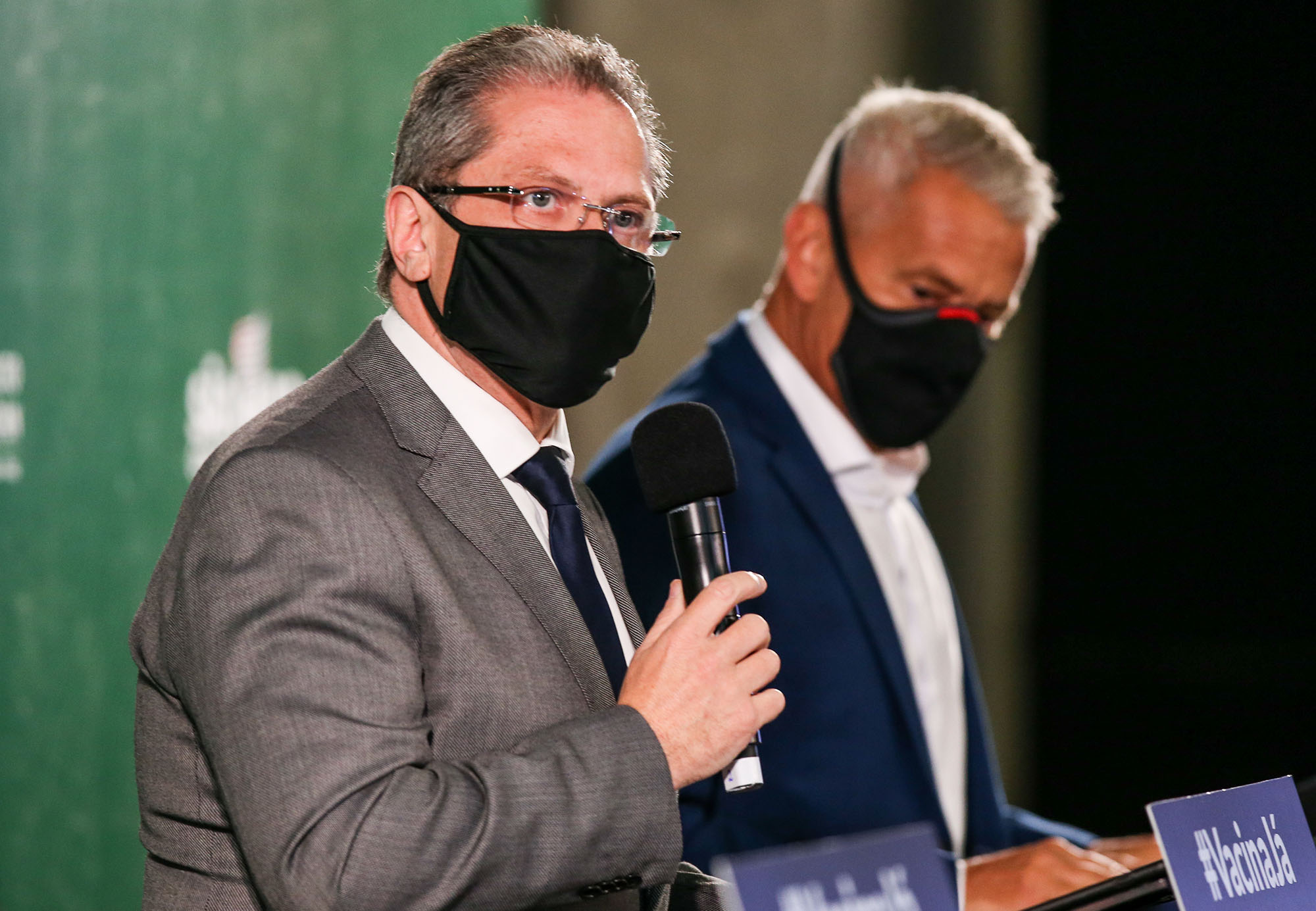
Sao Paulo state Health Secretary Dr. Jean Gorinchteyn speaks during a news conference on the CoronaVac vaccine clinical study at Butantan Institute on December 23. Alexandre Schneider/Getty Images
China's CoronaVac vaccine is the "the safest among the vaccines currently tested across the world," a top official at Brazil's leading biomedical research center said Wednesday, without releasing data to support the claim.
Butantan Institute director Dimas Covas made the comments at a news conference in São Paulo Wednesday, saying contractual obligations prevented him from speaking publicly about the vaccine’s efficacy.
The vaccine is currently in late-stage clinical trials in Brazil. The trials are being conducted by Chinese vaccine company Sinovac Biotech and the Butantan Institute.
Covas said all data collected in Brazil's trial was sent to China for Sinovac to review. Trial data will be released in time for a global media event in January.
Covas also said that while he could not discuss the findings of the trial, CoronaVac is effective enough to request emergency use authorization in both China and Brazil, signaling the vaccine is at least 50% effective.
The Pfizer-BioNTech and Moderna vaccines approved for emergency use in the United States are both up to 95% effective.
On Thursday, Brazil will receive 5 million doses of the CoronaVac vaccine, Covas said.
From CNN's Gisela Crespo
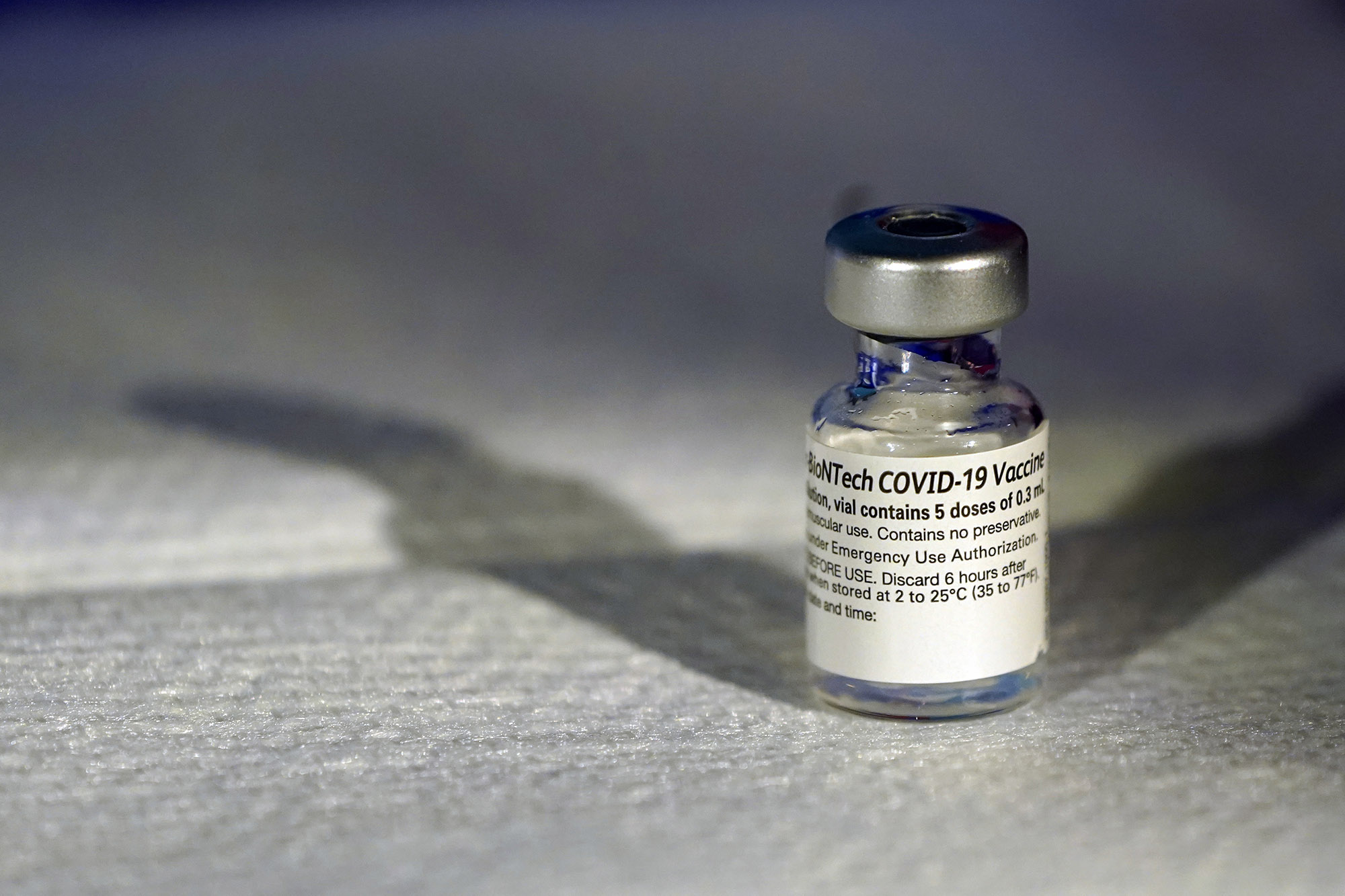
A vial of Pfizer's COVID-19 vaccine that received emergency use authorization is seen at George Washington University Hospital on December 14, in Washington, DC. Jacquelyn Martin-Pool/Getty Images
A person experienced a severe allergic reaction several minutes after receiving Pfizer's Covid-19 vaccine, the Alabama Department of Public Health said Wednesday in a news release.
The patient, who received the vaccine on Tuesday, is "stable and appears to be recovering," ADPH said.
The department said the patient had a previous history of severe allergic reactions to biological agents but decided to receive the vaccine following a risk assessment.
"As required by the emergency use authorization (EUA), the adverse reaction has been documented and reported to the manufacturer," ADPH added.
Vaccine numbers: As of Wednesday morning, 15,286 doses of the Covid-19 vaccine had been administered in Alabama, according to ADPH. More than 1 million Covid-19 vaccine doses have been administered across the US.
From CNN's Ellie Kaufman, Annie Grayer, Sara Murray and Andrea Kane
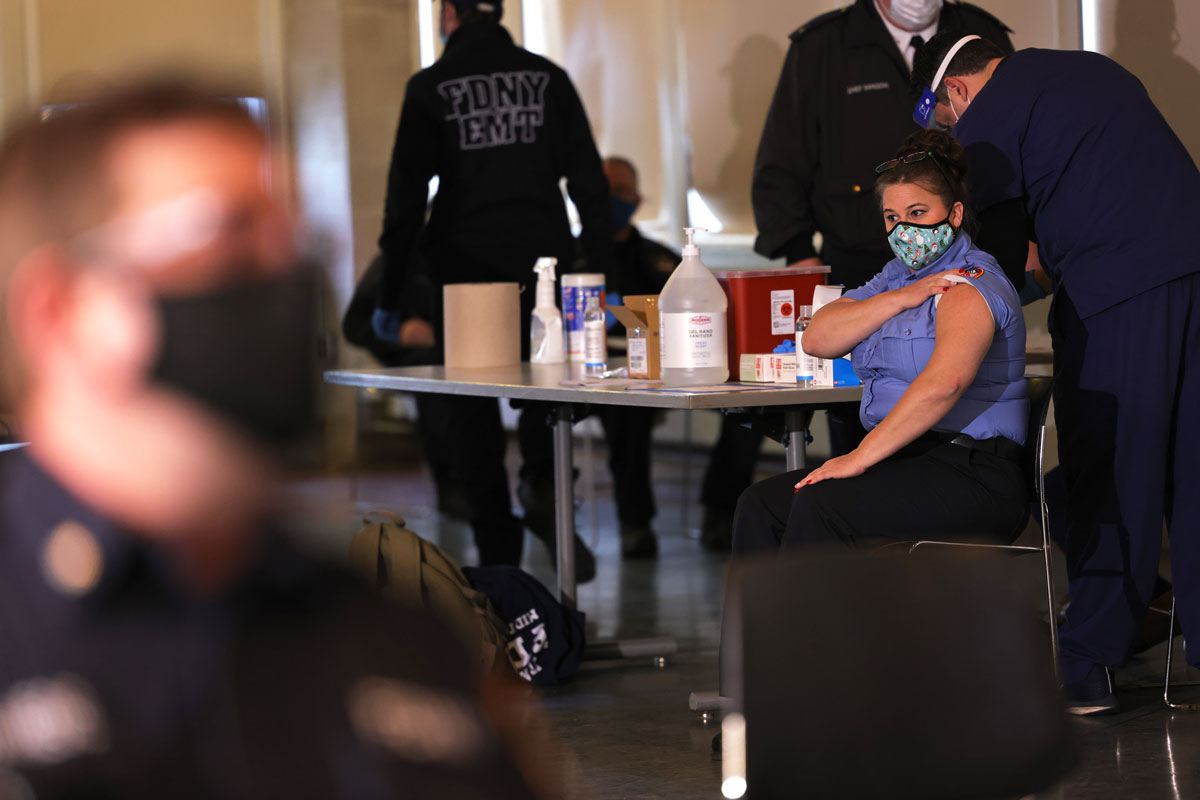
A member of FDNY EMS prepares to receive the coronavirus vaccine at the FDNY Fire Training Academy on Randall’s Island on December 23 in New York City. Michael M. Santiago/Getty Images
While the coronavirus pandemic continued to surge throughout the summer and fall, federal government officials repeatedly offered a ray of hope: enough vaccine doses to vaccinate 20 million Americans by the end of December.
But after the first week of vaccine distribution and with only nine days left to meet their self-imposed deadline, Operation Warp Speed is on track to fall well short of 20 million shots in arms.
One count, from the US Centers for Disease Control and Prevention, shows about 9.5 million doses have been distributed as of Wednesday morning and just over a million people have been vaccinated -- not even close to the 20 million goal Warp Speed originally set.
Officials at US Health and Human Services and the CDC say the agency's tallies are undercounting many vaccinations due to data lags, but even accounting for reporting delays, the US vaccination program appears to be taking longer than Warp Speed officials projected.
One early hurdle: A two-day US Food and Drug Administration requirement to assess each shipment of vaccine for quality control slowed down distribution. States were told by OWS to expect fewer doses for week two than originally planned. With the 20 million number seeming further from reach, OWS officials acknowledged Monday they may not get there until January.
"We do still feel strongly that we will have allocated to the states by the end of the year 20 million doses of vaccine that'll be available," Gen. Gustave Perna, Operation Warp Speed's chief operating officer said during the call Monday. "We feel confident that we will be distributing the end part of that vaccine no later than the first week in January for everybody to have access to."
Retrieved from: https://edition.cnn.com/world/live-news/coronavirus-pandemic-vaccine-updates-12-24-20/index.html
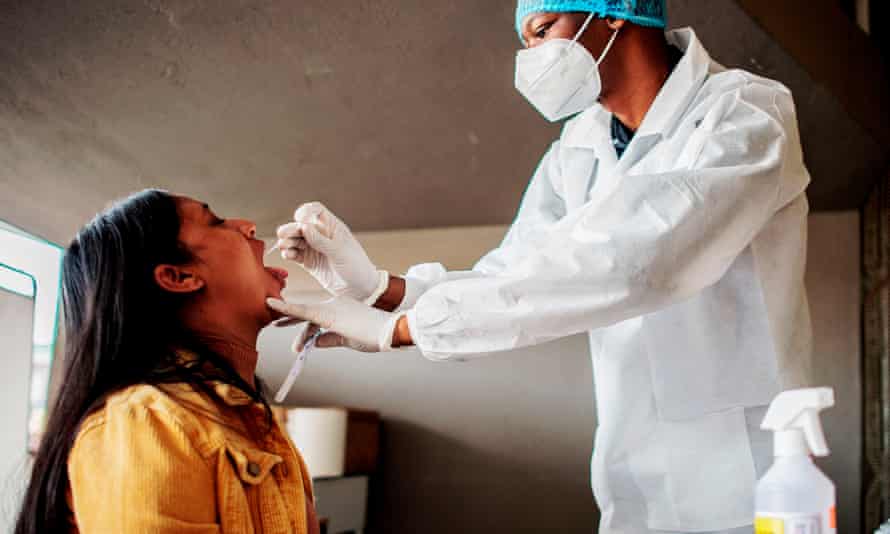
A nurse at Lancet Netcare hospital performs a Covid-19 test in Johannesburg. Photograph: Luca Sola/AFP/Getty
The South African variant of Covid-19, two cases of which have now been detected in the UK, is likely to be more transmissible, may hit young people harder, and may be slightly more resistant to vaccines, scientists in South Africa believe.
However, research is still continuing to confirm the threat posed by the variant, which does not appear to provoke more serious symptoms or require different treatment.
There are also some fears that the more numerous individual mutations of the South African variant may make it able to “re-infect” individuals who have already caught the virus and recovered.
Scientists in South Africa are still working “calmly and methodically” to fully understand the new variant, known as 501Y.V2. Data on the South African variant, which has swept across a swath of the country, has already been compared by scientists to the UK variant detected last week.
“Putting our data together with that in the UK, this [South African] variant is a bit more effective at spreading from person to person and that is not good. It means we have to get a bit better at stopping it,” said Dr Richard Lessells, one of the specialists leading research into the new variant in South Africa.
“Ours raises a few more concerns for a vaccine [than the UK variant] … Another worry is reinfection. We are currently doing the careful, methodical work in the laboratory to answer all the questions we have and that takes time.”
The mutations detected in new South African variant may allow the virus to better bind to and enter cells than previous variants, potentially easing transmission, scientists say.
The new variant was discovered through routine surveillance by a network of laboratories around South Africa, and found in almost 200 samples collected from more than 50 different health facilities. Originally confined to coastal regions, the variant is now spreading inland.
The new variant has multiple changes in the spike protein, the part of the virus that binds to cells inside the human body and that is also the main target for many of the antibodies produced during infection or after vaccination. Scientists have isolated one particular mutation – N501Y, common to both the new UK variant and that from South Africa – which they believe is important to its ability to spread fast.
“At this stage, there is no clear evidence of the new variant being associated with more severe disease or worse outcomes but clinicians are undertaking more studies to establish if this new variant does change the course of the disease,” scientists have told local media. “Patients will in all likelihood present with the same spectrum of symptoms as before.”
Epidemiologists point out that death rates could rise if the new variant spreads with a speed that overwhelms healthcare systems, however.
“This lineage spread rapidly, becoming within weeks the dominant lineage in the Eastern Cape and Western Cape provinces. While the full significance of the mutations is yet to be determined, the genomic data, showing the rapid displacement of other lineages, suggests that this lineage may be associated with increased transmissibility,” a research paper published this week said.
South Africa has recorded 940,000 cases of Covid-19, with almost 25,000 deaths, according to official statistics. Excess mortality studies suggest a death toll of more than 56,000.
At least five countries, including Germany, have imposed bans on travel from South Africa following the detection of the new variant.
After a first wave in South Africa peaked in July and August, the daily total for new cases fell dramatically. However, the number of new infections began to rise steeply at the beginning of December, reaching 11,000 earlier this week.
Many cases are among young people, aged 15 to 25, but it is unclear if this is a consequence of the new variant or behaviour. A series of mass parties celebrating the end of the South African school year have been blamed for accelerating the spread of infections. A second wave had been predicted in South Africa but not for another two to six months.
“It is still very early but at this stage, the preliminary data suggests the virus that is now dominating in the second wave is spreading faster than the first wave,” Prof Salim Abdool Karim, the chairman of the government’s ministerial advisory committee, said.
South Africa may see “many more cases” in the new wave than it experienced earlier this year, Abdool Karim said.
Retrieved from: https://www.theguardian.com/world/2020/dec/23/south-african-covid-19-variant-may-be-more-effective-at-spreading
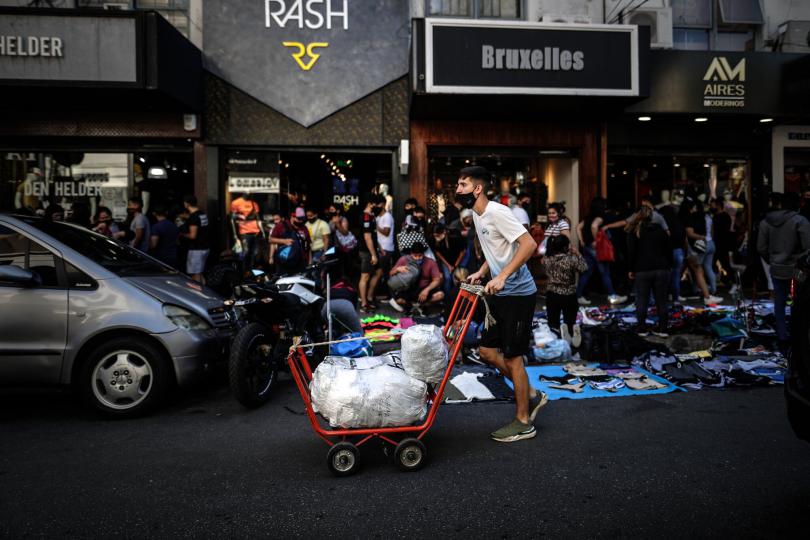
Shoppers at a flea market in Buenos Aires on Monday. Argentina announced that it had approved a Russian vaccine for emergency use.Credit...Juan Ignacio Roncoroni/EPA, via Shutterstock
Argentina’s Ministry of Health announced on Wednesday that it had approved the emergency use of Russia’s Sputnik V vaccine, making it the third country, after Russia and Belarus, to do so.
The Argentine government reached a deal with Russia’s National Center of Epidemiology and Microbiology, the maker of the vaccine, to provide enough doses for 10 million people by February, and another five million by March.
Argentine officials said that a plane sent to retrieve 300,000 doses had already arrived in Russia on Wednesday, and that the government would begin vaccinations before the end of the year.
News of Sputnik V has been met with hesitation in Russia and elsewhere. The vaccine has not yet completed human trials.
Russia is conducting a vaccination campaign using Sputnik V, and a number of other countries have also negotiated deals to receive the vaccine, including Brazil, India, Mexico and Venezuela, but none of these governments have approved it for use. On Tuesday, Belarus became the first country outside Russia to do so.
Two weeks ago, in an attempt to fight skepticism about the Russian vaccine among Argentines, President Alberto Fernández said he would be the first one to be inoculated once it arrives.
“I have no doubt in the quality of the vaccine,” he said at a news conference in Buenos Aires.
Argentina has been hard-hit by the virus, recording more than 1.5 million cases and 42,000 deaths. In a statement that stressed the scale of loss, the Argentine government said that it had seen data that verified Sputnik V’s safety and an efficacy exceeding 91 percent.
“The known and potential benefits outweigh the known and potential risks to public health,” the statement said.
Argentina also granted the Pfizer-BioNTech vaccine emergency approval on Wednesday, but it has not yet struck a deal with Pfizer to receive doses. Argentina was among the countries where that vaccine was tested.
Argentina does have a deal with AstraZeneca, which made a vaccine in partnership with Oxford University, to receive 22 million doses during the first months of 2021. But all of the planned purchases announced would cover less than half of the country’s population.
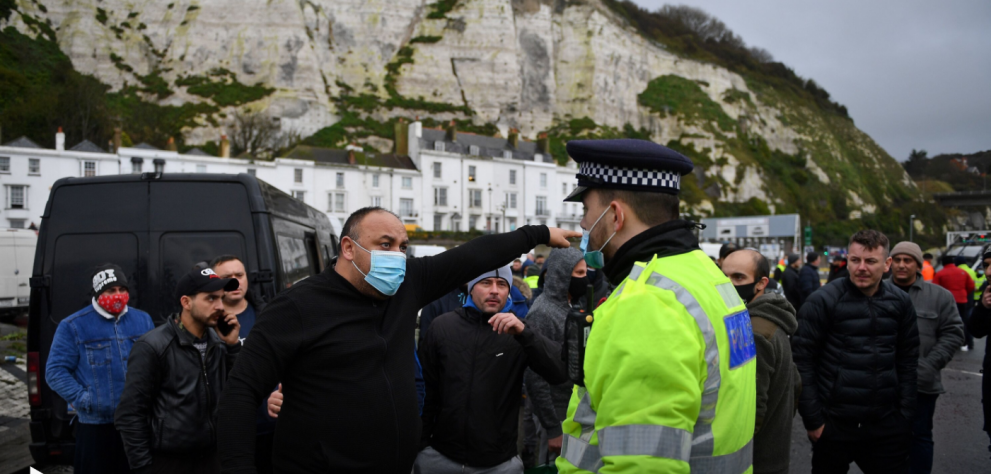
Mark Lowcock, the under-secretary-general of the UN’s humanitarian agency OCHA. Photograph: Geert Vanden Wijngaert/AP
Ferries and trains from Britain began arriving in Calais on Wednesday, as France reopened its ports to Britain after a 48-hour shutdown. But the logjam of thousands of Europe-bound trucks stuck in southeast England will take days to clear because drivers must show a negative coronavirus test before they can cross the channel.
The British army was mobilized to help the National Health Service, the country’s health care system, set up facilities to offer rapid coronavirus tests to drivers, who have been stuck in Britain since Sunday night, when France blocked passage to prevent the spread of a variation of the coronavirus that has swept through parts of England. Results from the test are usually available within 30 minutes, although the test is considered unreliable by some health professionals.
As testing sites were being set up Wednesday there was mounting frustration, confusion and skepticism about the plans in Dover. Trucks are parked around the ports, on closed sections of the motorway and at Manston Airport, a closed airfield nearby that has been turned into a giant parking lot for trucks.
Drivers were reportedly told they needed to go to the airport to take the tests, and it took until the afternoon before they were being administered. Drivers who weren’t at the airfield were reluctant to leave their spots in line closer to the border. Frustrations have been building and skirmishes have broken out among drivers, other waiting passengers and the police. One man was arrested after blocking a highway. For most of the day, access to the port was blocked by drivers and other travelers unwilling to move. Later in the day, another testing facility was set up at the port.
Hundreds of other freight drivers lined up along the motorway were told that tests would be administered to them where they were.
Authorities cautioned that it could take days to clear out the more than 5,000 Europe-bound trucks jammed into the area.
“I think it will take a few days to work our way through,” Robert Jenrick, (not Robert Jenkins, as was reported earlier here) a government minister, said on Sky News on Wednesday morning. Any drivers who received a positive test result, he said, would be offered a more accurate test, called a PCR test, which takes longer to process. If that was also positive they would be offered hotel accommodations to self-isolate for 10 days.
Rod McKenzie, the director of policy at Road Haulage Association, which represents the British road transport industry, said there were probably 8,000 to 10,000 trucks in Britain waiting to cross the border.
“It’s a mammoth task,” he told Sky News. “The border is still effectively shut, the testing is effectively not happening.” Some drivers have already spent three nights sleeping in their trucks with limited access to food and toilets.
Trucks in Europe carrying goods to Britain were still allowed to pass this week, but their numbers had declined amid fears that the drivers would be marooned once they crossed into Britain. The German airline Lufthansa flew 80 metric tons of fruit and vegetables from Frankfurt to the north of England on Wednesday for a supermarket supplier that chartered the flight. The airline said it was unusual to transport just a cargo of fresh goods on its own.
The crisis at the border has raised concerns about food supplies around the Christmas holidays, because Britain relies on importing fresh fruit and vegetables, especially in the winter.
“It is essential that lorries get moving across the border as quickly as possible,” Andrew Opie of the British Retail Consortium said. “Until the backlog is cleared and supply chains return to normal, we anticipate issues with the availability of some fresh goods.”
New South Wales health authorities are worried undetected Covid cases among office workers in Sydney’s CBD could spread the virus at Christmas gatherings, as the number of infections linked to the northern beaches cluster grew to 104.
The premier, Gladys Berejiklian, pleaded on Thursday with residents to “limit your mobility” over Christmas as she reported nine new community cases from a record 60,184 tests and warned NSW was “far from out of the woods”.
A temporary divide between the northern and southern sections of the northern beaches came into effect on Thursday with restrictions relaxed to varying degrees, allowing outsiders to enter parts of the locked-down hotspot over a three-day window from Christmas Eve to Boxing Day – Thursday to Saturday.
Two of the latest coronavirus cases have not yet been linked to the northern beaches cluster. Contact tracers have issued upgraded warnings for anyone who has been in the north-eastern part of the Sydney CBD recently to get tested and self isolate if they notice any symptoms.
One of the unlinked cases is an office worker employed in the vicinity of Hunter and Bligh streets, while the other visited the nearby Paragon Hotel Sports Bar on Loftus Street near Circular Quay between 12.45pm and 3.30pm on Wednesday 16 December.
Another person who was at the same sports bar has also tested positive, however, their test was returned after 8pm on Wednesday so it will officially be reported on Friday. The total number of cases who visited the sports bar on 16 December stands at three.
“There are potential chains of transmission that we are not on top of and that is a concern,” Berejiklian said of the CBD cases and the risk that workers could return to suburbs outside of the northern beaches and spread the virus. “We are far from out of the woods.”
The state’s chief health officer, Dr Kerry Chant, said that with venue alerts in place over multiple days for the north-eastern part of the city, anyone who had been in the area “should have a very low threshold for testing”. In addition to the Paragon Hotel, alerts have been issued for Australia Square, Chifley Square and the MLC Centre, including the food court.
Berejiklian said despite some relaxed restrictions in Sydney – including the 10-visitor limit on home gatherings temporarily excluding children under 12 – people still needed to limit their movement.
“Apart from those close family gatherings which we have allowed over the Christmas break, we don’t want people moving around unless you absolutely have to,” the premier said.
Chant on Thursday revealed that all passengers on a Qantas flight that left Darwin for Sydney on Friday 18 December were asked to get tested and self-isolate late on Wednesday evening. Health authorities continue to investigate how a crew member flying as a passenger on the service contracted Covid-19.
The crew member had worked on a repatriation flight from Paris last week and was not tested upon arriving in Darwin or transiting to Sydney but he subsequently tested positive on Sunday while in self-isolation at home.
Chant said the directive for all passengers to self-isolate was a “precautionary action” after a passenger on the flight travelled on to South Australia, where they have since tested positive. She said there was “very scant” information about the case and it could be a false positive as the passenger had tested negative when in NSW.
The SA chief health officer, Prof Nicola Spurrier, later said the man in his 20s likely returned a positive test due to an “old infection” still in his system. He was not seated near the Qantas crew member.
The man travelled from NSW via Wodonga in regional Victoria and crossed into SA at the Yorke Peninsula on Monday.
On Thursday afternoon, the Northern Territory removed greater Sydney, the Blue Mountains and the Central Coast as hotspots, allowing NSW residents from those areas to travel to the territory without quarantining.
“Those people that have arrived in the Northern Territory from the areas that have now been revoked as hotspots no longer need to self-quarantine or have a Covid-19 test unless you are feeling unwell and have … symptoms,” the territory government said in a statement.
Chant and the NSW premier acknowledged shortcomings in infection control after the Daily Telegraph reported that a worker who transports sick returned travellers into quarantine also transported an aged care resident before testing positive for Covid-19.
Chant said there was a rule preventing a worker from transporting both returned travellers and aged care residents, and “for some reason there was a reversion” – but the policy had now been reinstated.
Berejiklian added: “When you have thousands and thousands of people working to keep all of us safe, sometimes mistakes will occur, sometimes unintentional decisions will be made lower down operationally which shouldn’t be made for a temporary period.”
New venue alerts, including a directive to get tested and self-isolate for anyone who visited the Bondi Icebergs pool deck area on Sunday and Monday mornings, have been added to the list of NSW hotspots.
There are six mystery cases in NSW that authorities have not yet linked to the northern beaches cluster as contact tracers have been unable to confirm the transmission sources.
Retrieved from: https://www.theguardian.com/australia-news/2020/dec/24/nsw-authorities-fear-sydney-cbd-workers-could-spread-covid-at-christmas
Here are the key developments – and UK flight bans – from the last few hours:
· Canada becomes the second country to approve the Moderna vaccine for deployment. The Canadian government is also set to extend its ban on incoming commercial and passenger flights from Britain until January 6.
· The Treasury announces an additional £800m in coronavirus funding to the UK’s devolved nations. The fund will be split into £400m for the Scottish government, £200m for the Welsh government and £200m for the Northern Ireland executive.
· France has registered 14,929 new Covid cases and 276 more deaths in the last 24 hours, according to French healthcare data.
· Sinovac Biotech’s Covid-19 vaccine is reported to be 50% effective in late-stage trials, according to the newspaper Folha de S.Paulo on Wednesday.
· Peru is set to receive a “significant batch” of vaccines from the Covax alliance during the first quarter in 2021. The Covax global alliance was designed to help secure Covid-19 vaccines to poor and middle-income countries.
· New York has started requiring international visitors to quarantine on Wednesday to safeguard against the new variant of Covid-19 coming from the UK.
· Mexico will begin inoculating health workers on Thursday with the arrival of the first vaccines.
· The first batch of the Pfizer Covid-19 vaccine will reach Costa Rica on Wednesday night, with inoculations set to begin on Thursday, President Carlos Alvarado told a news conference.
· Northern Ireland has confirmed a case of the new UK Covid-19 variant. The positive case was found after a genome analysis was conducted on a small number of suspected cases.
· The current rate of coronavirus infections in South Africa is expected to soon surpass the record set during the first wave of the virus earlier this year, the health ministry warned.
· Argentina has become the first Latin American country to approve the Russian vaccine, the Sputnik V.
· The Moderna company have said that it expects its vaccine to be protective against the new variant reported in the UK.
· The UK government has implemented a travel ban on passengers arriving from South Africa after two cases of another new strain of Covid-19 was found in the UK.
· The European Union’s transport commissioner, Adina Valean has said that she is pleased stranded trucks are now moving “slowly across the Channel”, as restrictions between France and the UK were lifted.
Retrieved from: https://www.theguardian.com/world/live/2020/dec/23/coronavirus-live-news-us-cases-increase-14-in-one-week-france-to-reopen-uk-border